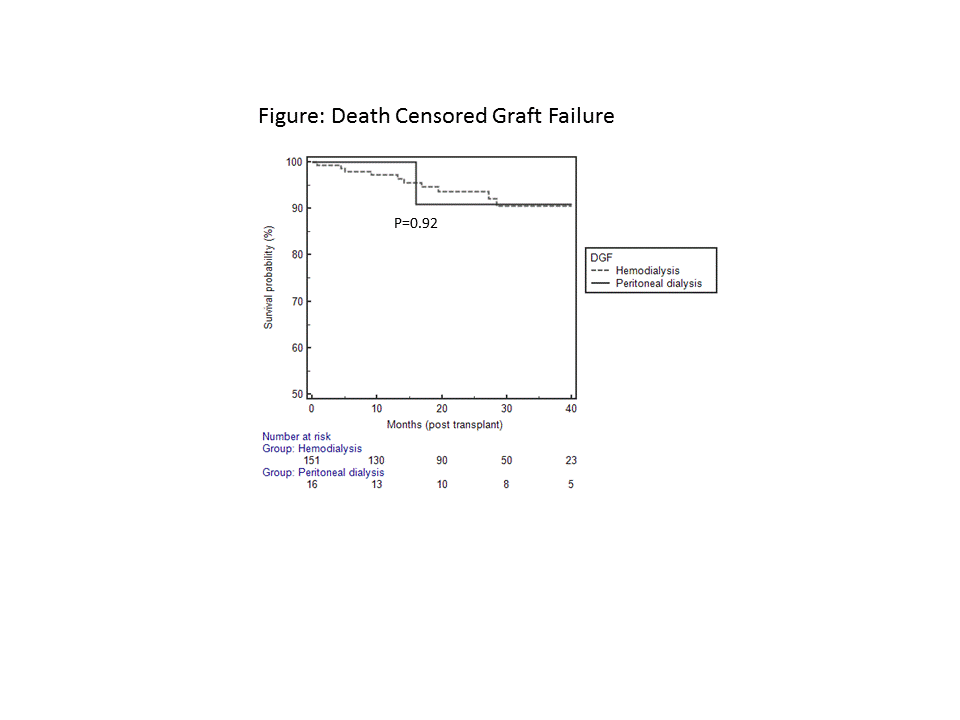Peritoneal Dialysis in Delayed Graft Function, a Safe and Effective Option
University of Wisconsin, Madison, WI
Meeting: 2020 American Transplant Congress
Abstract number: C-102
Keywords: Graft function, Infection
Session Information
Session Name: Poster Session C: Kidney Technical
Session Type: Poster Session
Date: Saturday, May 30, 2020
Session Time: 3:15pm-4:00pm
 Presentation Time: 3:30pm-4:00pm
Presentation Time: 3:30pm-4:00pm
Location: Virtual
*Purpose: Peritoneal dialysis (PD) has been utilized increasingly in the past decade. Many of these patients undergo transplantation and may require dialysis for delayed graft function (DGF). The outcomes of DGF based on the dialysis modality used is not well known.
*Methods: We retrospectively reviewed all adult kidney transplant recipients (KTR) who developed DGF between 11/2015 and 04/2019. Patients were divided into those who received hemodialysis (HD) or PD during the DGF period. Immediate graft explant, DGF among living kidney recipients or those requiring just a single dialysis treatment were excluded.
*Results: Of 224 KTRs with DGF during the study period, 167 fulfilled our selection criteria. There were 16 patients in the PD group and 151 in the HD group. Baseline characteristics were similar between the two groups except diabetes was more prevalent in HD group. There were 50 patients who were on PD pre-transplant but 34 of them were immediately switched to HD for DGF due to various reasons including intraoperative removal of PD catheter, creation of peritoneal window and hyperkalemia requiring emergent HD. In addition, 5 out of 16 patients who initially continued PD for DGF had to be transitioned to HD later in the course due to poor clearance (n=3), peritoneal fluid leak (n=1) or peritonitis (n=1). 36 out of these 39 patients, including 5 who were switched to HD required placement of central venous catheters (CVC). Two patients in the HD group had catheter-associated bacteremia. There was no difference in outcomes including DGF duration, hospital length of stay, infectious or surgical complications, rejection at various time periods, graft function at last follow up and graft failure. In multivariate analysis, only rejection within the first year of transplant (HR: 4.26, 95% CI 1.20-15.08, p=0.02) and post-surgical complications (HR: 3.79, 95% CI 1.03-13.91, p=0.04) were associated with death censored graft failure (DCGF). The use of PD for treatment of DGF was not associated with DCGF. (Figure)
*Conclusions: In carefully selected patients, peritoneal dialysis can be continued safely for DGF. This can prevent placement of CVC and subsequent risk of infections without compromising the outcomes.
To cite this abstract in AMA style:
Gardezi A, Muth B, Aziz F, Garg N, Mohamed M, Djamali A, Mandelbrot D, Parajuli S. Peritoneal Dialysis in Delayed Graft Function, a Safe and Effective Option [abstract]. Am J Transplant. 2020; 20 (suppl 3). https://atcmeetingabstracts.com/abstract/peritoneal-dialysis-in-delayed-graft-function-a-safe-and-effective-option/. Accessed February 18, 2026.« Back to 2020 American Transplant Congress

